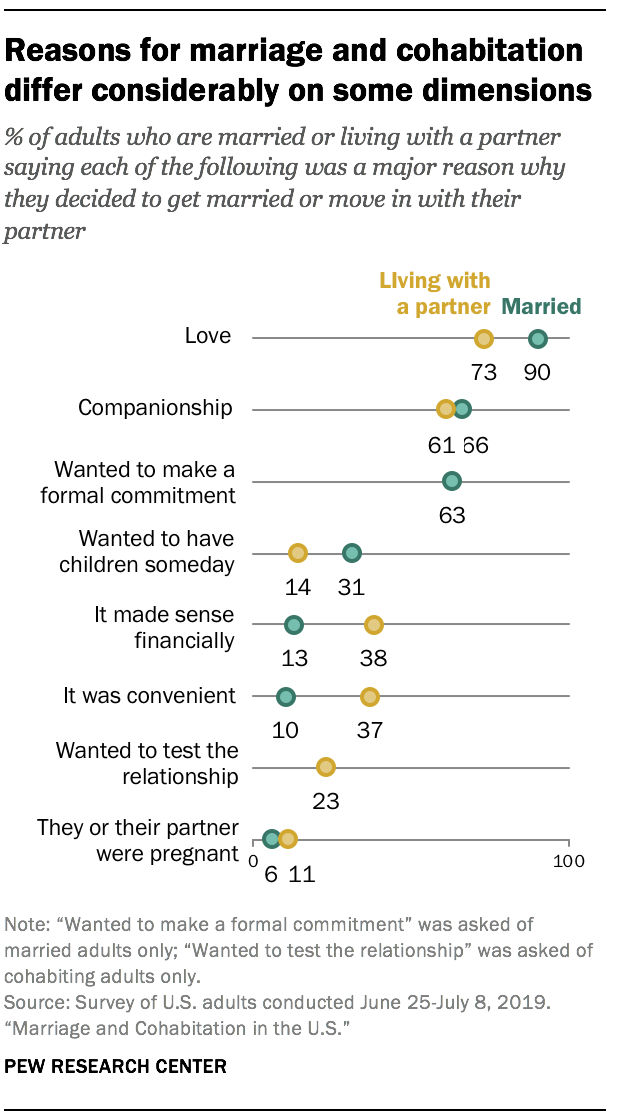
The decision to get married or to move in with a partner is a personal one, but for most married and cohabiting adults, love and companionship trump other considerations, such as the desire to have children someday, convenience or finances. For a majority of those who are married – especially if they didn’t live with their spouse before marriage –wanting to make a formal commitment is also a major factor in their decision to marry.
Among married adults who lived with their spouse before getting married and who were not engaged when they moved in together, about two-thirds say they thought of living together as a step toward marriage; 44% of adults who are currently living with a partner and were not engaged when they first started doing so say they thought of it that way when they moved in together.
About four-in-ten cohabiters who are not engaged say they want to get married someday, and 58% in this group say they are very likely to marry their current partner. When asked why they are not currently engaged or married to their partner, many cite financial reasons.
About four-in-ten cohabiting adults cite finances and convenience as major reasons why they moved in with their partner
Among married and cohabiting adults, love is cited more than any other reason for why they decided to get married or to move in with their partner: 90% of those who are married and 73% of those living with a partner say love was a major factor in their decision. Majorities in both groups also cite companionship as a major reason why they decided to get married (66%) or to move in with their partner (61%), and 63% of those who are married say they wanted to make a formal commitment.
Making a formal commitment is seen as a more important factor by married adults who did not live with their spouse before marriage. Seven-in-ten in this group say making a formal commitment was a major reason why they decided to get married, compared with 57% of married adults who had already been living together.
More practical reasons come into play to a greater degree for cohabiting adults than for those who are married. About four-in-ten cohabiting adults say moving in with their partner made sense financially (38% say this was a major reason why they decided to move in together) or that it was convenient (37%). Far smaller shares of married adults say these were major factors in their decision to get married (13% and 10%, respectively).
In turn, married adults are about twice as likely as those living with a partner to say that the fact that they wanted to have children someday was a major reason why they decided to get married: 31% of those who are married say this, compared with 14% of cohabiters who cite wanting to have children as a major reason why they decided to move in with their partner.
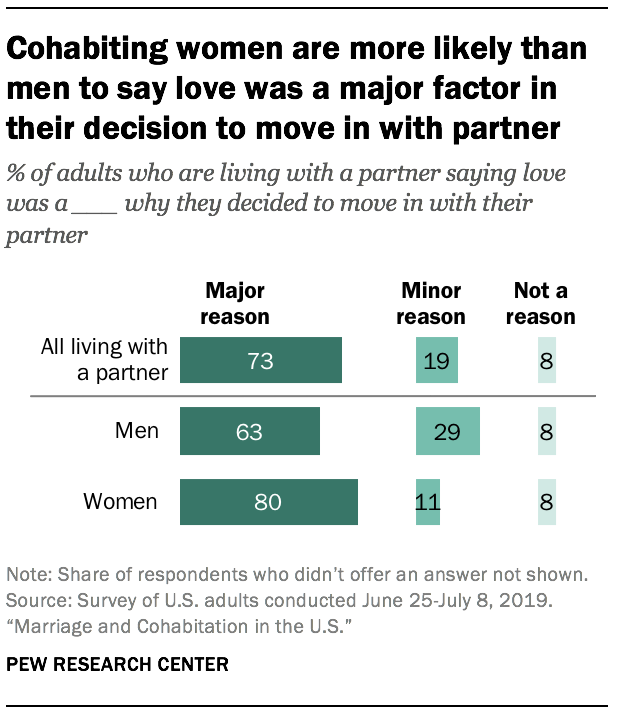
Among cohabiters, women are more likely than men to say love and wanting to have children someday were major reasons why they moved in with their partner. Eight-in-ten cohabiting women cite love as a major factor, compared with 63% of cohabiting men. And while 17% of women say wanting children in the future was a major factor in their decision to move in with their partner, 11% of men say the same. There are no notable gender differences among married adults.
There are also some differences across educational groups among married and cohabiting adults. About half of cohabiters with a bachelor’s degree or more education say finances (48%) or convenience (50%) were major factors in their decision to move in with their partner, compared with about a third of those with less education (36% cite finances and 33% cite convenience as major reasons). About one-in-ten cohabiters with some college or less education (13%) say a major reason for moving in together was that they or their partner were pregnant; just 4% of those with a bachelor’s degree or more education say the same. Among married adults, those with a bachelor’s degree or more education are more likely than those with less education to cite companionship (74% vs. 62%), wanting to make a formal commitment (70% vs. 58%) and wanting to have children someday (39% vs. 27%) as major reasons why they decided to get married.
For the most part, reasons for moving in together don’t vary considerably between cohabiters who are either engaged or in an otherwise very serious relationship and those who do not describe their relationship as very serious. But those who are engaged to their partner (78%) or who are not engaged but describe their relationship as very serious (83%) are far more likely than those who are in a less serious relationship (44%) to say love was a major factor in their decision to live with their partner. Cohabiters who are engaged (21%) or in a very serious relationship (15%) are also more likely than those who are not engaged and do not describe their relationship as very serious (7%) to say wanting to have children someday was an important part of their decision to move in with their partner.
Overall, about a quarter of those who are living with a partner say they are engaged to be married (27%), while half are not engaged but describe their relationship as very serious; 23% of cohabiters are not engaged and do not describe their relationship as very serious.
Many see living with a partner as a step toward marriage
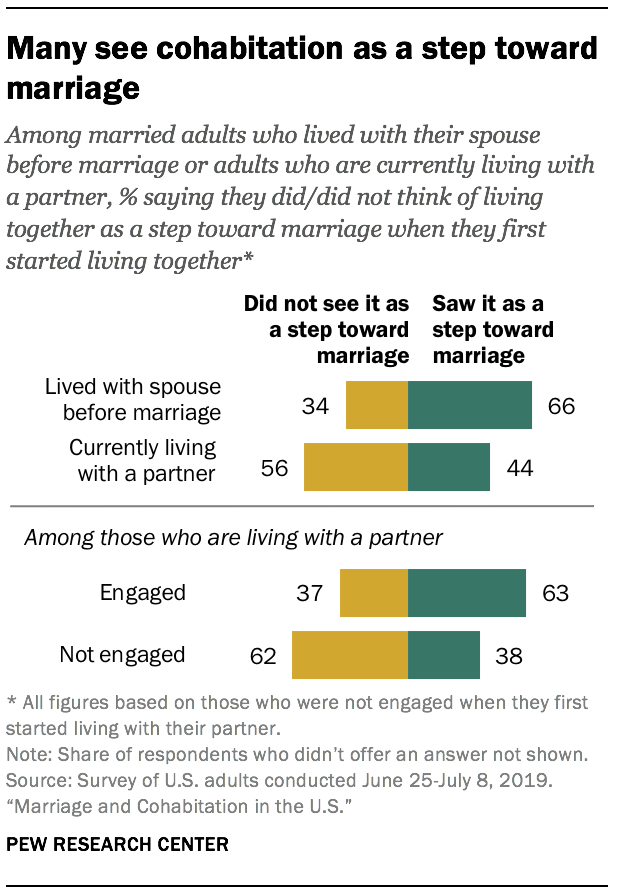
Among married adults who lived with their spouse before they were married and who were not yet engaged when they moved in together, 66% say they saw cohabitation as a step toward marriage when they first started living with their now-spouse. About four-in-ten cohabiters who were not engaged when they moved in with their partner (44%) say they thought of it this way when they started living with their partner, but the share rises to 63% when looking only at those who have since gotten engaged. A majority of married adults who lived with their spouse before marriage (73%) or who are currently engaged (84%) say they were not engaged when they first moved in with their partner.
Among cohabiters who are not currently engaged, half of those with a bachelor’s degree or more education (50%) and 43% of those with some college say they saw cohabitation as a step toward marriage when they first started living with their partner; smaller shares of those with a high school diploma or less education (28%) say the same.
About a quarter of non-engaged cohabiters don’t want to get married
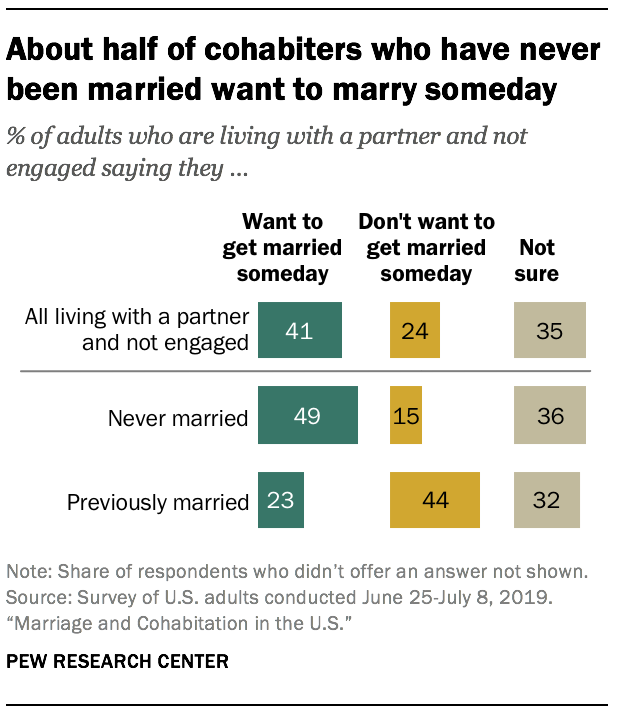
About four-in-ten adults who are living with a partner and are not currently engaged (41%) say they want to get married someday, while 24% say they do not want to get married and 35% are not sure. Cohabiters who have never been married (49%) are more likely than those who are divorced or widowed (23%) to say they want to get married in the future.
About six-in-ten cohabiters who are not engaged and say they would like to get married in the future (58%) say they are very likely to marry their current partner; 27% say this is somewhat likely, while 14% say it is not too or not at all likely that they will marry their partner. About one-in-five in this group (18%) say they and their partner often talk about getting married, while 48% say they talk about this sometimes and 34% say they and their partner rarely or never talk about getting married.
Many non-engaged cohabiters who want to get married someday cite finances as a reason why they’re not engaged or married
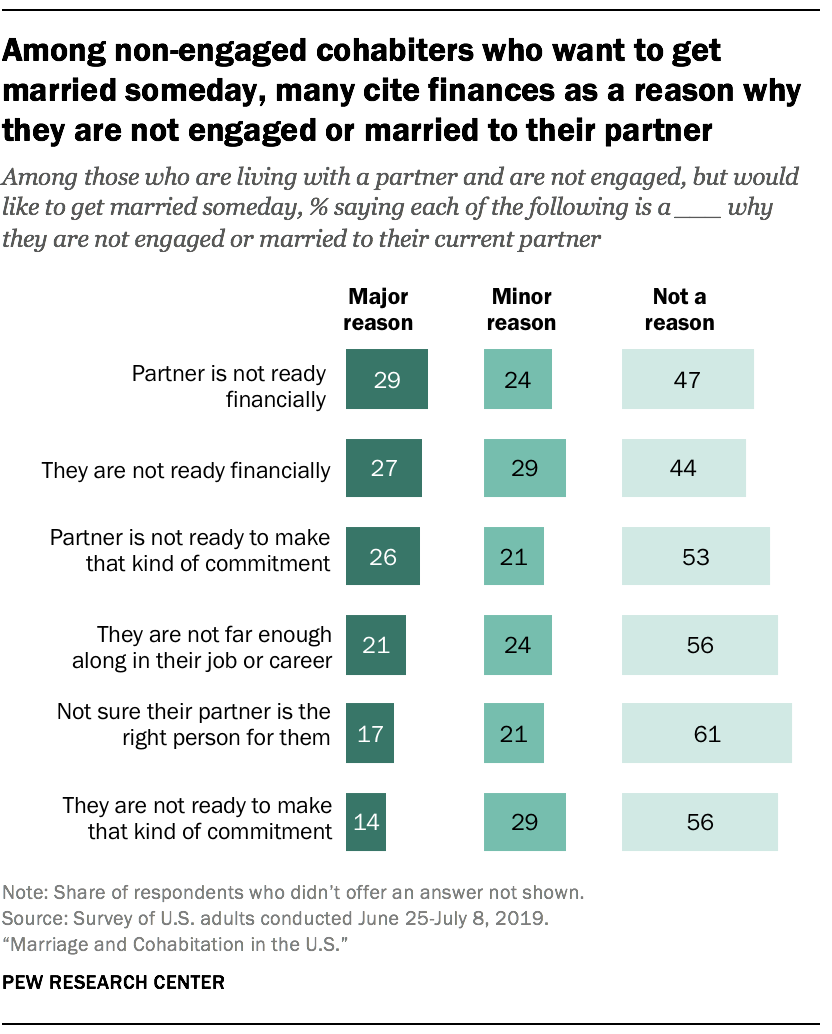
Two-thirds of cohabiting adults who are not engaged but say they would like to get married someday cite either their partner or themselves not being ready financially as a major or minor reason why they are not engaged or married to their current partner. About three-in-ten (29%) say their partner not being ready financially is a major reason and another 24% say this is a minor reason why they are not engaged or married. Similarly, 27% say their own lack of financial readiness is a major reason, while 29% say it is a minor reason.
Among adults who are living with a partner and are not engaged but want to get married someday, 21% say the fact that they are not far enough along in their job or career is a major reason why they are not engaged or married to their current partner; another 24% say this is a minor reason.
These cohabiters are more likely to cite their partner (26%) than themselves (14%) not being ready to make that kind of commitment as a major reason why they are not engaged or married; 29% cite their own lack of readiness in this regard as a minor reason (21% say the same about their partner’s lack of readiness), while about half say each of these is not a reason.
The survey also posed this question to cohabiters who are not engaged and are not sure they want to get married someday. For the most part, this group is less likely than those who do want to marry to cite the above reasons as explanations for why they’re not currently engaged or married to their current partner. There are two exceptions, however. Cohabiters who aren’t sure if they want to marry are more likely to say not being personally ready to make that kind of commitment and not being sure their partner is the right person for them are reasons why they are not engaged or married to their current partner.
In general, cohabiters don’t feel much pressure to get married
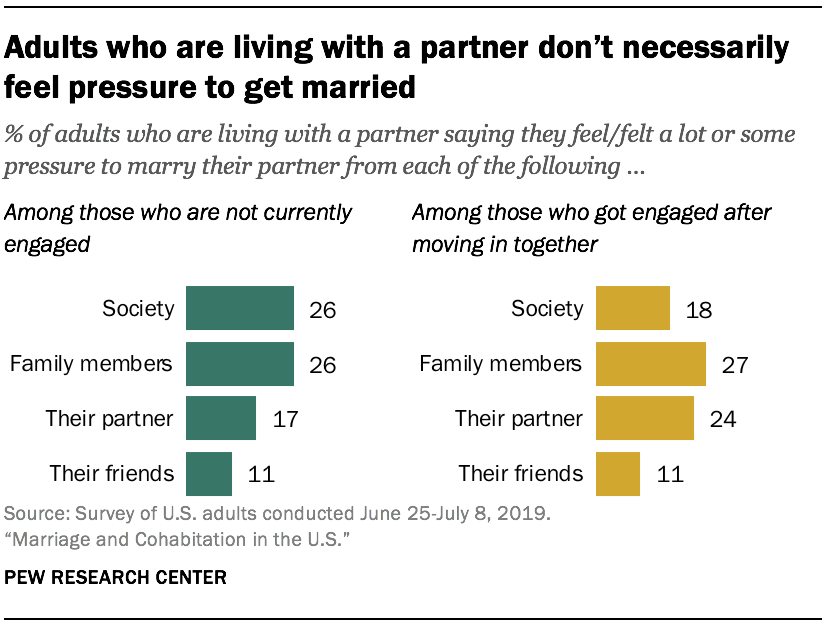
Relatively small shares of cohabiters who are not engaged say they feel pressure to marry their partner: about a quarter say they feel at least some pressure from family members (26%) or from society (26%), while even smaller shares say they feel pressure from their partner (17%) or from their friends (11%). Similar shares of engaged cohabiters who got engaged after moving in with their partner say they felt pressure to get married after they moved in together.
Among non-engaged cohabiters in opposite-sex relationships, men (24%) are more likely than women (12%) to say they feel at least some pressure from their partner to get married.
Americans see commitment as a prerequisite to both marriage and cohabitation
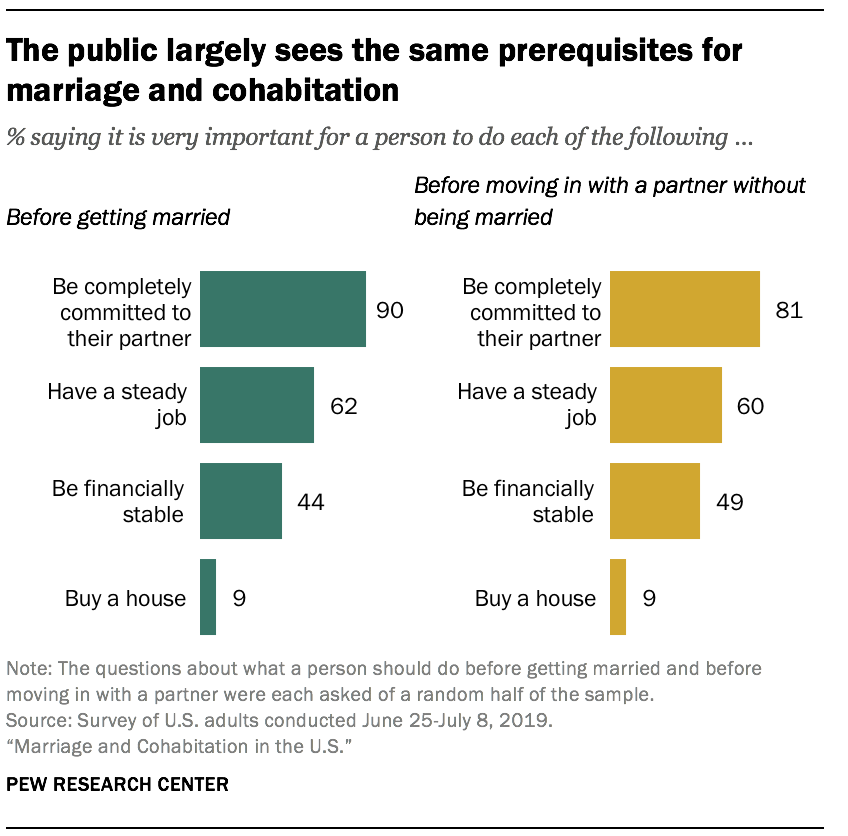
Most U.S. adults say it is very important for a person to be completely committed to their partner before getting married (90%) or moving in with a partner without being married (81%).10 About six-in-ten think it’s very important for a person to have a steady job before getting married (62%) or moving in with a partner (60%), and 9% say it’s very important for a person to buy a house before doing each of those things. About half (49%) say being financially stable is very important before moving in with a partner; 44% say this is very important for a person to do before getting married.
For the most part, women are more likely than men to say each of these is very important for a person to do before getting married or moving in with a partner. For example, about two-thirds of women say it’s very important for a person to have a steady job before getting married (67% vs. 58% of men) or moving in with a partner (66% vs. 54%). And while about half of women say it’s very important for a person to be financially stable before getting married (48%) or moving in with a partner (53%), smaller shares of men say the same (40% say this is very important before marriage and 44% say it is very important before moving in with a partner).
Adults with some college or less education are more likely than those with at least a bachelor’s degree to say it’s very important for a person to have a steady job (68% vs. 50%) or to be financially stable (47% vs. 38%) before getting married. Those without a college degree are also more likely than college graduates to say having a steady job is very important before moving in with a partner (64% vs. 52%), but similar shares across educational attainment – about half in each group – say being financially stable is very important prior to cohabitation.
Cohabiting adults are more likely than those who are married to see being financially stable as a prerequisite for marriage: About half of those living with a partner (49%) say this is very important for a person to do before getting married, compared with 39% of married adults. Cohabiting adults are also more likely to say buying a house is very important before getting married, although small shares of cohabiters (12%) and those who are married (8%) say this. And while large majorities of both groups say it’s very important to be completely committed to their partner, married adults (92%) are more likely than those who are cohabiting (81%) to say this.
When it comes to possible prerequisites for cohabitation, there are no significant differences between married and cohabiting adults when it comes to the importance of being completely committed to one’s partner, having a steady job, buying a house or being financially stable before moving in with a partner.




